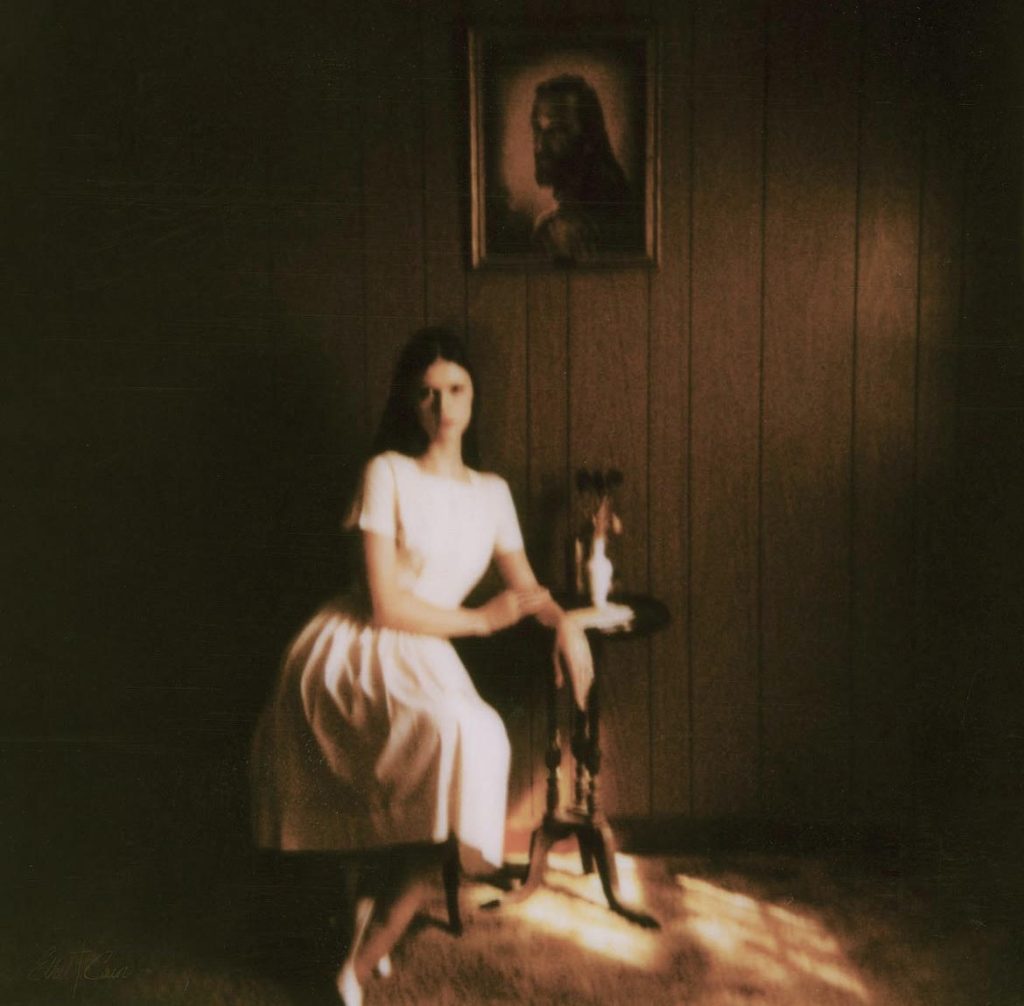ALBUM REVIEW: Ethel Cain disputes the sanctity of Christianity through ‘Preacher’s Daughter’
Ethel Cain’s “Preacher’s Daughter” tells the haunting tale of innocence lost under the merciful eye of God.
Fully aware that Halloween and Thanksgiving season are long over, this writer still can’t help but be entranced by the beautifully macabre. It would be such a shame if I kept this gem to myself. So, I’d like to introduce all of you to a very interesting artist this week.
Hayden Silas Anhedönia, better known by her stage name Ethel Cain, is a Southern Gothic, Americana, and dream pop singer from Tallahassee, Florida. Growing up in a Southern Baptist household, Cain found herself deeply involved with the faith from a very young age. At the age of 8, she became part of her church choir and began studying how to play the classical piano. In the beginning, she found most of her musical inspiration from classical Christian music.

Later on in life, though, Cain began searching for inspiration in other musical genres through other artists such as Florence Welch (Florence and The Machine). She discovered a new deep love for art pop, alternative rock and country music. At the age of 12, she had come out as gay to her entire family. And at the age of 16, she left her church altogether. Coming from a small town, she was completely ostracized and shunned by everyone she knew. This sat deeply with Ethel, and made roots into what her future music career would center around.
Ethel created what I believe to be her greatest work in 2022. Her official debut album, named “Preacher’s Daughter,” was a concept album that centered around the life of a Southern Baptist girl: a humble believer, but a hopeless romantic that dreamt of escaping her small town in pursuit of a beautiful love. Little did she know that her naivety would lead her to impending doom.
For the sake of deciphering the storyline alongside you all, I will be briefly touching on some of the first songs, as Ethel encourages first time listeners to do the same. As a concept album, it is a heavily plot-driven story in musical form. Ethel also uses extensive metaphors, which has left fans coming up with theories for certain songs. I will be sharing my resolute theory on what I believe the storyline to be.
Starting off with “Family Tree (Intro),” we are greeted with a Southern Baptist sermon introducing the importance of the matriarch in the family dynamic: “A woman, a mother, is a very special thing… Because the mother is the one who loves the Lord and always seems to be there when we need her.” Immediately after, we are met with the somber words of Ethel: “These crosses all over my body remind me of who I used to be… Jesus can always reject his father, but he cannot escape his mother’s blood.” We can safely assume that this introduction is a future version of our main character lamenting her future decisions, and especially lamenting whatever wrong she has committed against her mother. The matriarch, and perhaps the person who raised her deeply in the faith. Our main character lives and dies in shame, “swinging from the neck of (her) family tree.”
We experience a sort of whiplash with our first official song of the album, “American Teenager.” We are plunged into gorgeous vibrato chants, swerving into an up-beat teenage dream pop song. Our main character, a teenager yet, questions her faith and experiences life in her small town. A typical teenage existential crisis, we see this life through her eyes. She describes how she “Grew up under the yellow light on the street, putting too much faith in the make believe” and how “The neighbor’s brother came back in a box. But he wanted to so maybe it was his fault.”
Not only do we gain a better understanding of the main character, but we also collect bits and pieces that make up her surroundings: the typical white Americana neighborhood, deep in faith, patriotism, and domestic abuse. But she wants more, as she asks: “Jesus, if you’re there. Why do I still feel alone in this room?”. We also learn of this character’s newly found alcohol abuse, as she begins to attend sermons drunk, but insists that even with a “head full of whiskey, they always deliver”.
We know from the second half of “American Teenager” and the second song “A House in Nebraska” that this existentialism and loss of faith was not just a typical teen crisis. Meeting her first true love on “…A dirty mattress on the second floor,” we assume that things have taken a turn for the worse. Not only does our main character have a drinking problem, but she now has a drug problem as well. She meets this “first true love” during one of her first highs, and she reminisces on that time which she swears was absolutely magical. She grieves the loss of this love, as we are told “that [she’s] the reason [he] won’t come home”. We can assume that his leaving was attributed to their drug use and her alcohol abuse. He moved on somewhere else, and she stayed behind, “…Call[ing] home that house in Nebraska.”
In the next song, “Western Nights,” we see the continuous naivety and impulsive nature of the main character. Even though she beckoned death for the loss of her first love, she seems to have moved on to another one. Her second love that rides Harleys, breaks into ATM’s and “…Shows his love in shades of black and blue.” Now in a domestic abuse situation, our main character fawns over her new lover and has completely cut ties with her family so “they don’t worry.” Fully aware of the toxicity of this relationship, she “clings onto [him] like a love-blind addict.”

We are then newly introduced to “Family Tree,” a seven-minute version of the introduction. Whereas we have straightforward religious references in the introduction, here, we are met with the exact same first lines, which are then twisted to demonstrate the direness of her current relationship: “Give myself up to him in offering, let him make a woman out of me. I’m just a child but not above violence. My mama raised me better than that.”
Here, we learn a very important factor of this relationship that we did not know of before. Our main character is still a minor, and most likely was groomed by this second lover. Not only is this a co-dependent, abusive relationship, but we learn there could be Stockholm Syndrome involved. She now refers to him as a godly figure, and she is no longer just blindly in love. She is losing herself.
This downward spiral is marked with our sixth song, “Hard Times.” As the song entails, our main character is growing older, and is no longer as naïve and dependent as she once was. She begins to call into question her relationship with this man and mentions her father. As per the album name, her father was the town preacher who has long since passed away. She recalls how “In the corner, on [her] birthday, [her father] watched [her]. Dancing right there in the grass. [She] was too young to notice that some types of love could be bad.”
This helps us understand the reason why our character is so deeply depressed, co-dependent and suffers from addictive tendencies. Enduring past abuse from her father, she subconsciously floats towards men with similar attributes. We are also subliminally told that her second lover was killed during a robbery, and she struggles to move on from this death.
“Thoroughfare” marks a new beginning for our main character. She has now moved to Texas, and on the thoroughfare, she meets a new love. But for once, a good love. Instead of jumping in headfirst into this romance, they begin a casual affair traveling the country together, slowly falling in love over the course of months. She importantly states that: “For the first time since I was a child, I could see a man that wasn’t angry.” And though they both state how they have been battered and hurt by love before, they decide to try after traveling the entire west together.
“Gibson Girl” brings us another unexpected change. Though we had been so convinced that this third love was healthy and both characters were thriving, we are immediately told that this lover’s words were honeyed lies. He had only been interested in her body, and he took advantage of her homelessness to sell her for his own profit. She is forced into prostitution, and now spends her days pouring drinks and servicing customers, all while being beaten and abused by this same third lover.
“Ptolemaea” is this album’s most disturbing and surprisingly popular track. For those who are not aware, “Ptolemaea” is based on Dante’s Infernos third circle of hell, the torture grounds for treacherous sinners. In this song, the main character is force-fed drugs by her abusive lover and begins feeling the full weight of all the suffering she has had to endure.
The composition of this song is heavily inspired by Gregorian chants, as we hear a droning Ethel in the background. It all crescendos into wispy, fading vocals of nonsensical hums. Occasionally making sense, it leads into increasingly darker, shaky vocals that mimic the true fear our character feels towards this man, who she no longer considers her lover. He is her captor, her tormentor. He keeps her chained, drugged so she can’t escape. “What fear a man like you brings upon a woman like me. Please don’t look at me, I can see it in your eyes”.
Three minutes in, it happens. The weight falls on us, the listeners. Droning “Stop. Make it stop. I’ve had enough,” and the most blood-curdling scream. Our character knows the danger she is in. She knows the curse that runs in her bloodline, the “Daughters of Cain.” Her mother and grandmother: “…Bound to suffering eternal through the sins of their fathers committed long before their conception.” But in a moment of lucidity, she wakes and runs through the woods. Hoping to escape her captor… She doesn’t make it.
“August Underground” and “Televangelism” show us our character’s sealed fate. Not only has she been captured, but she has also been killed. And going off the title of “August Underground” (which is also the name of an extreme snuff film), we can assume what fate awaited her after death. “Televangelism” walks us towards the afterlife alongside her. We have no lyrics in either song. Only instrumentals. But we can hear the horror from “August Underground”: Quiet, subliminal and uncomfortable. Clouded by white noise, more Gregorian vocal drones and so much reverb that it makes the original instrumentals near indistinguishable. As compared to “Televangelism”, which is a soft, warm piano solo. We can feel the character’s ascension into heaven, a beautiful choir of angels accompanying the escalating piano. She has finally found peace.
Though our main character has died, “Sun Bleached Flies” examines the matriarchal figures in her town. Looking back on her life, she notices the way it seems that this yearning for freedom and escape was not only shared by her. Trying to escape their fathers, and their fathers’ fathers. We can also assume these feelings were shared by the character’s mother and grandmother: “Sun-bleached flies sitting on the windowsill waiting for the day they escape… But I always knew that in the end, no one was coming to save me. So, I just prayed, and I keep praying and praying and praying.” Ending on a bittersweet note, our character reminisces about that house in Nebraska: “I can’t let go when something’s broken. It’s all I know and it’s all I want now.”
Though it can be brutal and hopeless in many ways, it also does an amazing job at showing the truth about religious trauma and domestic abuse situations in the real world.
“Strangers,” the final track of this album, is one of my favorite songs of all time. Our character visits her body one last time and witnesses it’s torment even in the afterlife. She has become a “freezer bride, [his] sweet divine,” something to satiate his never-ending carnal hunger for her. Yet she sings with such gentleness, she regards him as handsome as he walks towards her. And pleads over and over how “[She] tried to be good.” She is now only a “memory restricted to a polaroid in evidence”. Her final goodbye to her killer was a stomachache, as her voice once again picks up in emotion, using repetition to show her conviction: “Am I making you feel sick?”
The last lines are dedicated towards her mother, as she laments the life they both had to endure, as well as apologizing for the way she died. She urges her not to “think about it too long or she’ll never sleep a wink at night again”. It all closes off with a final “Mama just know that I love you, and I’ll see you when you get here.”
Heart-wrenching, haunting, yet beautifully composed, “Preacher’s Daughter” is an artistic form of musical media that should be admired for its intricate storytelling, lyricism, and subject matter. Though it can be brutal and hopeless in many ways, it also does an amazing job at showing the truth about religious trauma and domestic abuse situations in the real world. Ethel was inspired by both her own experiences, the learned experiences of others, as well as true religious-based crime. So, if you are a fan of impeccably written horror stories, both dreamy and ghastly music production, I recommend you check the full album out and listen in order. “Preacher’s Daughter” is currently out on all music streaming platforms, and there is also a YouTube video for “American Teenager” that really captures the heart of the song.



